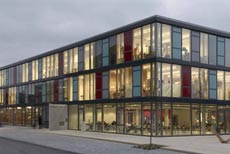| Main | Births etc |
|---|
| Detmold | |
|---|---|
| The princely castle. | |
| Country | Germany |
| State | North Rhine-Westphalia |
| Admin. region | Detmold Region |
| District | Lippe District |
| Founded | |
| First mentioned | |
| Subdivisions | 26 |
| Government | |
| • Mayor | Rainer Heller (SPD) |
| Area | |
| • Total | 129.39 km2 (49.96 sq mi) |
| Elevation | 134 m (440 ft) |
| Population (2010-12-31)[1] | |
| • Total | 72,758 |
| • Density | 560/km2 (1,500/sq mi) |
| Time zone | CET/CEST (UTC+1/+2) |
| Postal codes | 32701–32760 |
| Dialling codes | 05231/05232 |
| Vehicle registration | LIP |
| Website | www.detmold.de |
Detmold (German pronunciation: [ˈdɛtmɔlt]) is a city in North Rhine-Westphalia, Germany, with a population of about 74,000. It was the capital of the small Principality of Lippe from 1468 until 1918 and then of the Free State of Lippe until 1947. Today it is the administrative center of Lippe District and of Regierungsbezirk Detmold.
History[]
Middle Ages[]
Detmold was first mentioned in 783 as Theotmalli, and in 1005 a Tietmelli or Theotmalli region (Gau) is referred to in documents. In 1263, Bernard III of Lippe fortified the settlement at the crossing of the trade route from Paderborn to Lemgo over the Werre River with stone walls and granted it a municipal charter. Its population was reported in 1305 as 305. Market rights granted in 1265 led to rapid economic development. Its defenses were greatly strengthened after severe damage had been inflicted on the town during the conflict with Soest in 1447. A major fire in 1547 destroyed more than 70 houses.

Engraving of a view of the town of Detmold by Matthäus Merian, 1647
In 1550, Detmold became the permanent residence of Count Simon III of Lippe. The counts were elevated to princes in 1789, and Detmold remained the capital of the small Principality of Lippe until the end of the First World War in 1918, when all princely states in Germany were abolished.
Modern era[]
Street lighting was introduced in 1809, with oil-fired lanterns. By 1835, the town had become the most populous in Lippe, with over 4,000 residents. It grew to 12,000 in 1900 and over 30,000 in 1950.
From 1919 to 1947, Detmold was the capital of the Free State of Lippe. When Lippe was incorporated into the new German state of North Rhine-Westphalia, the town became the seat of the Lippe district, and since 1972 it is the seat of the county administration of Lippe. With the administrative reform of 1970, 25 nearby villages were incorporated into the city.
Main sights[]

Hiddeser Bent, moor near Donoper Teich
- Hochschule für Musik Detmold (Music Academy of Detmold)
- Hochschule Ostwestfalen-Lippe (Ostwestfalen-Lippe University of Applied Sciences)
- Westfälisches Freilichtmuseum Detmold (Westphalian Open Air Museum)
- Lippisches Landesmuseum (Museum)
- Landestheater Detmold (Theater)
- Hermannsdenkmal (Arminius Monument)
- Adlerwarte Berlebeck (Falcon
- Fürstliches Residenzschloß, a Renaissance castle in the center of the town park.
- Donoper Teich (pond)
- Hasselbachteich (pond)
- Vogelpark Heiligenkirchen (bird sanctuary)

Building on the Campus Detmold of the Hochschule OWL (2010)

Market and town hall.
Culture[]
The town supports the Nordwestdeutsche Philharmonie for regular symphony concerts.
Twin towns — sister cities[]
Detmold is twinned with:
Personalities[]

Ferdinand Freiligrath
Well-known personalities born in Detmold include:
- Ferdinand Freiligrath (1810–1876) poet and author
- Georg Weerth (1822–1856)
- Christian Dietrich Grabbe (1801–1836), alongside Georg Büchner the most important innovator of German-language drama in his time
- Joseph Plaut (1879–1966), actor, spieler, elocutionist, singer and regional poet
- Hans Ottomeyer (b 1946), art historian, for 11 years curator of the German Historical Museum in Berlin
- Iris Berben (b 1950), actress
- Frank-Walter Steinmeier (b 1956), former foreign minister and chancellor candidate for the SPD
- Andreas Voßkuhle (b 1963), president of the Bundesverfassungsgericht
- Manfred Ostermann (1958–), German local politician (independent) and currently (2010) Landrat for Soltau-Fallingbostel
- Jürgen Stroop (1895-1952) - German Nazi general of the SS, war criminal
- Heinz Burt (1942-2000) British musician and member of the Tornados
- Peter Lampe (b 1954), German theologian
Important people who lived and worked in Detmold for a long time include:
- Albert Lortzing (1801–1851), composer
- Johannes Brahms (1833–1897), composer
- Heinrich Drake (1881–1970), politician
- Felix Fechenbach (1894–1933), government president of the resistance fighters
- Thomas Quasthoff (b 1959), bass-baritone
Amongst the honorary citizens of Detmold, besides politicians are scientists and artists who have served in Detmold. The best-known are the builder of the Hermannsdenkmal, Ernst von Bandel (1871), Reich Chancellor, Otto von Bismarck (1895), and Reich President, Paul von Hindenburg (1917).
References[]
- ^ "Amtliche Bevölkerungszahlen" (in German). Landesbetrieb Information und Technik NRW. 31 December 2010. http://www.it.nrw.de/statistik/a/daten/amtlichebevoelkerungszahlen/index.html.
External links[]
| |||||||
| This page uses content from the English language Wikipedia. The original content was at Detmold. The list of authors can be seen in the page history. As with this Familypedia wiki, the content of Wikipedia is available under the Creative Commons License. |

